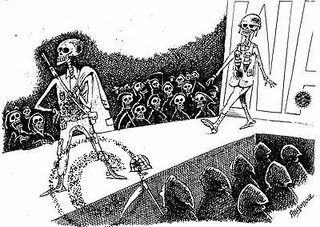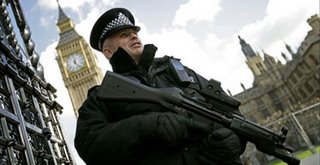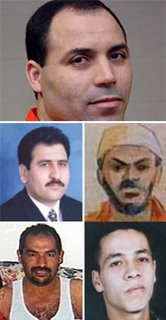The Middle Eastern Arms Race
As if the bloody Iraq civil war, continuing flare-ups in Palestine and the occasional bombing in Lebanon were not proof enough of the growing instability in the entire Middle East, the arms trade show that opened last weekend in the United Arab Emirates — and the billions of dollars that mainly Sunni states in the region intend to spend there — surely is a sign that, post toppling of the Saddam Hussein regime in 2003, all is not well in the area.

Of course, for the US arms industry, the news that states like Saudi Arabia, to give but one example, intend to spend as much as US$50 billion at the fare purchasing fighter aircraft, cruise missile and attack helicopters, is delightful. But in the wake of an invasion that was hailed as a new birth for the Middle East (remember the Bush promise of bringing democracy to the region), the arms race by states whose record on democracy is far from envious (again, Saudi Arabia) and whose purchasing of those weapons cannot but prop the undemocratic regimes (if all the projected deals fall through, weapons providers will be making as much as US$60 billion in sales), is as clear a sign if ever there was one that the whole quixotic endeavor was utter failure. Nothing proves this failure more than an arms race pitting Shiite Iran (and its allies in states like Lebanon and Syria) and Sunnis.
Not satisfied with already having failed in Iraq and perpetuated hatred for Israel through its moral and political support for Jerusalem’s actions in the Occupied Territories and, last summer, in Lebanon, the US is now banking on the fears it has created by demonizing Tehran and its nuclear program — added to its accusations that failure in Iraq is the result of Iranian meddling there — to arm the region.
So, from the prospect of democratization a mere four years ago, what the world now faces is a divided Middle East whose constituents are racing against time to equip themselves with the means to wage war against one another. If, as many fear, the US decides to launch strikes against Iran, either because of its actions in Iraq or, more likely, its nuclear program, Saudi Arabia will have little choice but to side with Washington and could be sucked into the conflict (though, despite the billions it already has spent purchasing arms from the US, the kingdom is far from capable of engaging in a modern military confrontation, as it was in 1991, which led to the deployment of US troops there to prevent an Iraqi invasion; and of course whatever it is that Riyadh bought over the weekend will take years before it is integrated into its armed forces). Furthermore, an attack on Iran cannot but engender some reprisal from Tehran itself as well as its regional ally Hezbollah in Lebanon, which itself is on the brink of an internal armed conflict — a conflict that, in turn, would lead to Syrian and Israeli participation, as happened in the 1980s.
It is surprising how little has changed, except for the amplification, through inept military adventurism and a total abandonment of diplomacy by Washington and, to a lesser extent, London, of old divides. The solution, it appears, is not, despite Condoleezza Rice’s tour of the region, a new diplomatic course, but rather selling an unprecedented quantity of weapons to states on the brink of war.
If, in the wake of London’s decision to pull out of Iraq, Washington still wonders whether it should pack up and leave, a region-wide conflagration involving a mix of terrorism, insurgency and conventional battles surely would be the tipping point. The last time the US took a hands-off approach to a military conflict in the Middle East was in the 1980s, when Iraq launched an invasion of Iran. That conflict lasted eight years, with devastating consequences.
If Taiwan serves as an example (and there is no reason to believe that Washington’s relationship with Middle Eastern states is any different), there is no imagining what the pressure on so-called “allies” in the region for them to buy military equipment must be like. These states are being told that they must buy weapons to a level largely dictated by Washington so that they can defend themselves, or at least hold off until the US can intervene. If they fail to do so, as Taipei now has for a few years, they will be reprimanded by Washington. Through shadowy, backroom diplomacy engineered by influential arms vendors, Middle Eastern kingdoms are spending billions buying weapons that can only lead to their defeat, for no one will ever win such a complex conflict as a Middle East-wide war.
Who in his right mind — except those whose sense of morality has been rotten by greed — could look at the arms expo in the UAE and see this as a positive development? Given the situation, such arms fares should be banned altogether.
 Sixty years ago, on Feb. 28, 1947, began what would lead to the slaughter of between 20,000 and 30,000 Taiwanese during a security crackdown by Republic of China officers. The event, which ostensibly was sparked the previous day by a dispute between a cigarette vendor and an anti-smuggling officer, quickly turned into a days-long civil disorder and open rebellion against the corruption and illegitimacy of the regime that, since the handover by former colonial occupier Japan in 1945, had imposed its rule on the island. The distant Kuomintang (KMT) regime on the mainland soon sent reinforcements and in the ensuing days its officers launched in sometimes random, sometimes systematic killings. An American visiting at the time reported beheadings and rapes. The incident, for which recently released accounts now put the blame on Chiang Kai-shek (蔣介石), opened the door to the White Terror era, which lasted until 1987 and during which tens of thousands of Taiwanese were disappeared, imprisoned or killed.
Sixty years ago, on Feb. 28, 1947, began what would lead to the slaughter of between 20,000 and 30,000 Taiwanese during a security crackdown by Republic of China officers. The event, which ostensibly was sparked the previous day by a dispute between a cigarette vendor and an anti-smuggling officer, quickly turned into a days-long civil disorder and open rebellion against the corruption and illegitimacy of the regime that, since the handover by former colonial occupier Japan in 1945, had imposed its rule on the island. The distant Kuomintang (KMT) regime on the mainland soon sent reinforcements and in the ensuing days its officers launched in sometimes random, sometimes systematic killings. An American visiting at the time reported beheadings and rapes. The incident, for which recently released accounts now put the blame on Chiang Kai-shek (蔣介石), opened the door to the White Terror era, which lasted until 1987 and during which tens of thousands of Taiwanese were disappeared, imprisoned or killed.




